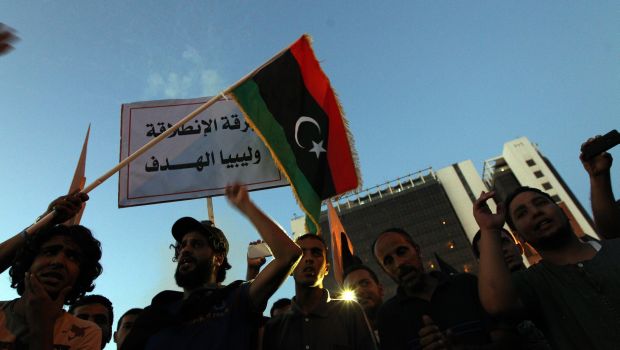
File photo—Benghazi residents celebrates Martyrs’ Day on September 16, 2013. (AFP PHOTO/ABDULLAH DOMA)
Bolam, who worked at the head teacher of a private school in Benghazi, was released on Thursday, was freed following concerted efforts by British intelligence and local intermediaries from Libya’s security apparatus, the sources said, adding that “some of the intermediaries were also carrying British nationality.”
The BBC has also reported that a ransom was paid, but said it was “unclear” how much money had change hands and “who paid it,” adding that the British Foreign Office was not involved in the negotiations.
Bolam had appeared in a video in August referencing a prisoner swap between another Islamist faction and the US in order to free a kidnapped US citizen (believed to be US soldier Bowe Berghdahl, who was freed in May after a prisoner-swap deal with the Afghan Taliban). Bolam pleaded with British Prime Minister David Cameron to do everything within his power to “please allow me to go back to my family.”
Asharq Al-Awsat tried to contact the British ambassador to Libya, Michael Aron, but he was not available for comment.
The Foreign Office has said Bolam is now “safe and well” and has been reunited with his family. It had previously requested a media blackout on the kidnapping, fearing any publicity could endanger Bolan and ruin any chances of his release.
It is still unconfirmed which group kidnapped the 63-year-old, but one prime suspect is a group known as Jaish Al-Islam. No releases or statements have been made by the group since the release of Bolam.
This comes as another British hostage, aid worker Alan Henning, was beheaded by the Islamic State of Iraq and Syria (ISIS) in Syria on Friday, while a number of other Westerners have also been kidnapped by Islamist groups in the region, including in Iraq and Algeria.
Meanwhile, a high-profile Libyan security official, who requested anonymity because he was not authorized to brief the media, told Asharq Al-Awsat the Libyan capital Tripoli was now under the “complete control of forces belonging to Misratan rebels and their extremist allies,” in reference to a number of Islamist militants carrying out an operation known as “Libyan Dawn” aiming to take control of the capital and its main international airport.
“The forces of Libyan Dawn . .&3160;. are in complete control of all state, government and ministry buildings [in the city],” the source said.
But the source also added that Tripoli was “quiet and calm at the moment,” due to people’s preoccupation with the Eid Al-Adha celebrations, and that nothing “outside of the ordinary” was currently happening. No “obvious dispersal of [rebel] troops throughout the city” had occurred, as they “did not want to provoke the people [of the city].”
But other sources said the Islamist fighters did have an obvious presence in the city, and that Sami Al-Saadi, a former leader of the Libyan Islamic Fighting Group—one of the Islamist factions embroiled in the current fighting—led the Eid Al-Adha prayers at one of Tripoli’s Martyrs’ Square.
The sources also told Asharq Al-Awsat that the newly elected prime minister of one of Libya’s current two rival parliaments, Omar Al-Hassi, had attended the prayer. Hassi was elected by the outgoing parliament, the General National Congress (now rebranded as the House of Representatives), with the rival, internationally-recognized parliament sitting in the city of Tobruk.
“The attendance of Omar Al-Hassi, leader of the so-called National Salvation Government which is supported by the Muslim Brotherhood, and some members of the General National Congress, gave the impression there was complete cooperation between the Islamists and Hassi’s government,” the source said.
